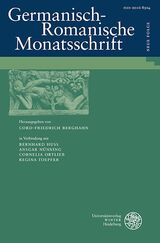Author: Ansgar Nünning
- «
- 1
- »
The search returned 5 results.
Wenn xenophobe Patrioten eine Reise tun…: Tobias Smolletts ‚Travels through France and Italy‘ als Paradigma für die Präfiguration von Dichterreisen und für britische Wahrnehmungsstereotypen im 18. Jahrhundert Beitrag
(Trans-)National Criteria, Norms and Standards in Literary Studies Beitrag
A Comparative Analysis of Criteria-Based ‘ex ante’ Evaluation Forms of Funding Proposals in the Humanities
Kriterien und Standards der Literaturwissenschaft Beitrag
Debatten, Denkanstöße, Desiderate
Renaissance und Neue Forschungsrichtungen der Narratologie Beitrag
Ansätze, Grenzüberschreitungen und Impulse für die Literaturwissenschaften
- «
- 1
- »
